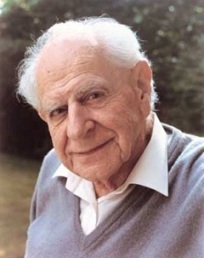Karl Popper
(philosopher) | ||||||||||||
|---|---|---|---|---|---|---|---|---|---|---|---|---|
 "Conspiracy theory of society" critic | ||||||||||||
| Born | 28 July 1902 Vienna, Austria-Hungary | |||||||||||
| Died | 17 September 1994 (Age 92) London, England, UK | |||||||||||
| Nationality | British | |||||||||||
| Alma mater | University of Vienna | |||||||||||
| Member of | Mont Pelerin Society | |||||||||||
| Interests | • Open Society • “conspiracy theory” | |||||||||||
One of the 20th century's most influential philosophers of science.
| ||||||||||||
Sir Karl Raimund Popper was an Austrian-born British[1] academic of Jewish heritage, and one of the 20th century's most influential philosophers of science[2], coming up with the concept of an "open society", that later was latched on to by George Soros and his Open Society Foundations.
Popper was also a critic of conspiracy theories, especially the analysis of the state as an instrument of a ruling class, where he claimed the moving forces of history are not the result of a cunning conspiracy on the part of ‘big business’ or of ‘imperialist war-mongers’, but the unwanted social consequences of actions, directed towards different results, by agents who are caught in the network of the social system.[3]
Contents
Theories can never be proven, only falsified
Popper is known for his rejection of the classical inductivist views on the scientific method in favour of empirical falsification. According to Popper, a can never be proven, but it can be falsified, meaning that it can (and should) be scrutinised with decisive experiments. Popper was opposed to the classical justificationist account of knowledge, which he replaced with critical rationalism, namely "the first non-justificational philosophy of criticism in the history of philosophy".[4]
Open Society
In political discourse, Karl Popper is known for his vigorous defence of liberal democracy and the principles of social criticism that he believed made a flourishing open society possible. His political philosophy embraced ideas from major democratic political ideologies, including socialism/social democracy, libertarianism/classical liberalism and conservatism, and attempted to reconcile them.[5]
Conspiracy theory of society
Karl Popper criticised what he termed the "conspiracy theory of society," the view that powerful people or groups, godlike in their efficacy, are responsible for purposely bringing about all the ills of society. This view cannot be right, Popper argued, because "nothing ever comes off exactly as intended."[6] According to philosopher David Coady, "Popper has often been cited by critics of conspiracy theories, and his views on the topic continue to constitute an orthodoxy in some circles."[7] However, philosopher Charles Pigden has pointed out that Popper's argument only applies to a very extreme kind of conspiracy theory, not to conspiracy theories generally.[8]
References
- ↑ https://www.thebritishacademy.ac.uk/sites/default/files/94p645.pdf
- ↑ "Profile: Karl R. Popper – The Intellectual Warrior"
- ↑ http://www.naturalthinker.net/trl/texts/Popper,Karl/Popper%20-%20The%20Open%20Society%20and%20its%20Enemies.htm
- ↑ "Rationality versus the Theory of Rationality"
- ↑ "Karl Popper (1902–94) advocated by Andrew Marr"
- ↑ "Conjectures and Refutations, 4th ed", Karl Popper, publisher Routledge Kegan Paul, 1972
- ↑ "Conspiracy theories : the philosophical debate", David Coady, publisher Ashgate, 2006
- ↑ "Popper Revisited, or What Is Wrong With Conspiracy Theories?" Charles Pigden, 1995, journal Philosophy of the Social Sciences
Wikipedia is not affiliated with Wikispooks. Original page source here